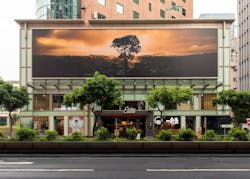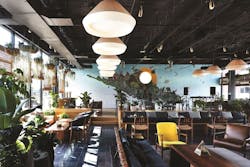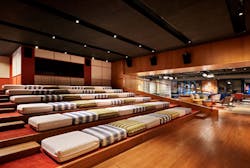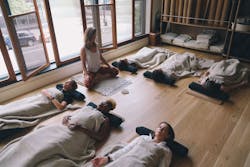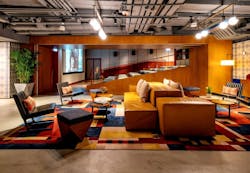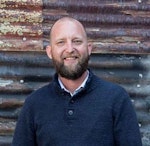What if hotels were places that not only welcomed paying guests, but also the communities in which they are situated? What if these spaces became platforms for creativity and social and environmental impact? What if hotels looked more like cultural centers, hosting art exhibits, talks, concerts, films and radio programs? What if these built environments housed holistic wellness centers and member workspaces, in addition to restaurants, bars and coffee shops?
Now, what if we told you these hotels already exist?
Welcome to Eaton Workshop, a mission-driven global hospitality company dedicated to shaping a better world based on the values of inclusivity and equity, providing a platform that holds space for belonging, expression and collective change.
A Vision for Transformation
For founder Katherine Lo, who studied anthropology and film and worked in the film industry prior to launching Eaton Workshop in 2014, the leap to hospitality wasn’t as large as one might expect. Her family’s business is in real estate and hotels, so when Lo’s father presented her with the opportunity 10 years ago to start a new hotel brand that better reflected today’s rapidly changing world, she accepted.
“I took on that challenge and said yes, and so the inspiration for Eaton has come from my background in social and environmental justice,” Lo recalled. “I worked as an activist for many years from film, from anthropology, my experiences in music and wellness, as well as design and architecture.”
In 2017, Lo hired Sheldon Scott, who is a formally trained psychotherapist-turned-storyteller and fine artist with a long work history in the restaurant side of the hospitality industry. As its director of culture, he described his role as building “the connective tissue in the property and the community in which it sits and really takes Kat’s vision for this space as a welcoming hub for the community and to put that into action and build trust and communication with the community,” he said.
He is currently serving as the company’s global head of purpose, where his primary responsibility is “to be the steward of our Triple Bottom Line initiatives—people, profit, and planet—and to make sure we are building, maintaining and developing the projects in the program that support all three of those initiatives for us, both here in Hong Kong and the properties we’re developing in North America,” he said.
Lo opened both the Eaton DC hotel and its Hong Kong property in 2018 and has stayed true to her values and mission to revolutionize the industry.
“Our vision is to have a fairer world where we provide the optimal conditions for people and communities to thrive,” Lo said. “Eaton’s mission is that we are basically a force to transform hospitality into a place for creativity, community and social and environmental impact. The values that we go by are integrity, empathy, imagination and inclusivity.”
From Concept to Reality
The Eaton hotel concept began much like any other design project would: as ideas on paper. Lo faced the additional challenge of bringing together people from a variety of distinct industries, from hospitality to construction and project management, as well as those from creative fields and advocacy groups.
Lo said the process of integrating these different backgrounds and experiences presented a significant learning curve for the team, as they faced the realities of renovating and operating their properties while building the brand, hiring and executing their vision. “In the first few years, we really did it organically, and we were learning as we went from the ground up,” she recalled.
[Related: MASS Design Group Proves Architecture Is a Catalyst for Social and Environmental Healing]
But staying on mission helped guide their decision-making and enabled them to articulate their vision through a Triple Bottom Line approach and institutionalize their values to make them practical.
“Over the years as we brought it to life, Sheldon and I talked a lot about how every single decision is informed by a very focused intentionality to our mission and our values—everything from hiring, who we collaborate with, to our practices, all the way from the construction and architecture process to now the operating and sourcing,” she said.
Seven years later, Eaton Workshop has successfully launched a type of third space, community-building hotel concept while weathering the global pandemic that hit the hospitality industry particularly hard.
An Invitation to Re-imagine the Built Environment
One of the things Eaton Workshop has done in the process of creating a new model for hospitality is inviting architects and designers to re-imagine how they utilize the tools and traditions of design and architecture to create fair, community-driven and more equitable communities. They are inviting design practitioners to work with their team of creative innovators and a values-based mission with the financial resources of a commercial developer, Lo said.
“Eaton is really this hybrid, both commerce-driven but also cultural and community space, so I think it’s been a really unique opportunity for them to work with us to bring those ideas to life,” Lo explained.
Scott noted that when the company goes into new markets, its primary interest before building a structure is the act of community building—an approach he believes can help architects and designers rethink how they approach their own profession and consider how they can build communities and spaces for purpose rather than just erecting another building.
“I think that that perspective will really help to inform the future of design and architecture, because it reframes your work, it puts your work in the context and brings a bit more legacy into the conversation,” he said.
At Eaton hotels, this philosophy is translated into public spaces that are engaging and open, encouraging flow and activation of social and cultural activities. Traditional walls and barriers are rethought, broken down or reimagined, and flexible-use spaces are supported, Lo said.
The radio station, cinema, member workspaces, food and beverage, music venues and wellness spaces are designed to enrich each other. Every offering is priced to support the local community, holding spaces for marginalized people and essential workers to participate for free.
Guest rooms at Eaton appeal to purpose-driven travelers with sustainability-focused service, artwork by local creatives, mindful and artisan amenities, and high-tech essentials.
Designed for Inclusion
Eaton properties are designed to welcome the local public, and thus the architectural storefront with the street is crucial to how Eaton expresses its local engagement with the community.
“Oftentimes, when I’m taking people through a tour of the building, I talk about how porous the design is as a hotel and community center,” Scott said.
With multiple entryways and extensive use of glass, Scott said they’ve created many opportunities to invite people to walk into the space—unlike traditional hotels that are designed to mitigate the flow of traffic on and off the property.
“This is one of the ways that I often reference that intersection of design where the impact can really be seen, because this place not only operates as a community center, but it looks like one—it’s a very inviting space where you don’t have to have a hotel room in order to engage the space,” he explained.
Regardless of whether someone is a guest at the hotel or not, everyone feels welcome even if they are staying only for a few hours—and that’s by design.
“In doing what hasn’t been done before, in attempting to evolve an industry which has run for decades on systemic privilege, what’s validating is to hear the feedback from Eaton’s community members in D.C. and Hong Kong who work on climate change to gender to refugees, and how much Eaton’s space and resources have meant to them,” Lo said.
Hearing from marginalized communities such as LGBTQ, Native American, Black and underground creatives who say they’ve never felt accepted or at home in a public commercial space until Eaton has been incredibly rewarding, she added.
Naturally, this sense of inclusion isn’t limited to Eaton’s hotel properties. The company “walks the talk,” in that half of its management team consists of women of color and over two-thirds are BIPOC—not to mention the fact that Lo is one of few women and Asian-American hotelier founders working alongside one of the few Black global hotel executives.
“Alongside so many companies forming task forces to increase diversity, it took a lot of intentionality to get Eaton to where it is today,” Lo said.
Scott points out that we all have a role and a responsibility to make the world a better place, and if the past two years have taught us anything, it’s how deeply interconnected we truly are.
“These concepts, these constructs of borders, countries, lands and languages—those things really pale in comparison to the power of humanity, and how we are connected to each other,” he said. “And I think building and designing for purpose—I hope to see it become the dominant narrative in architecture and design and would encourage young designers and architects to look towards that as their inspiration for their future and their practice.”
Read next: Improving Native American Healthcare Through Design

